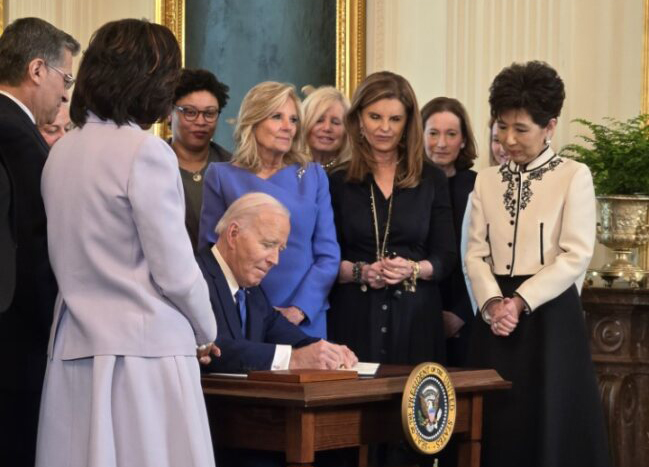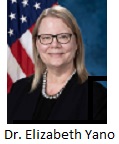Office of Research & Development |
 |


President Biden signed an executive order to strengthen and prioritize federal research on women's health issues, attended by VA researcher Dr. Elizabeth Yano.
March 29, 2024
By Tristan Horrom
VA Research Communications
"Seeing the collective work of so many stakeholders in Women Veteran's health and health care contributing to the executive order was incredibly exciting and bodes well for our ability to ramp up research capable of transforming their care."
President Biden signed an executive order March 18 to strengthen and prioritize federal research on women's health issues, a measure the White House called, "the most comprehensive set of actions ever taken to advance women's health research and innovation."
This historic moment was the culmination of over a year of efforts by many advocates including Dr. Elizabeth Yano, director of VA's Women's Health Research Network, whose work was crucial to ensuring VA was at the table in the discussions leading up to the executive order.
 "Seeing the collective work of so many stakeholders in Women Veterans' health and health care contributing to the executive order was incredibly exciting and bodes well for our ability to ramp up research capable of transforming their care," said Yano, who is also the director of the Center for the Study of Healthcare Innovation, Implementation and Policy at the VA Greater Los Angeles Healthcare System.
"Seeing the collective work of so many stakeholders in Women Veterans' health and health care contributing to the executive order was incredibly exciting and bodes well for our ability to ramp up research capable of transforming their care," said Yano, who is also the director of the Center for the Study of Healthcare Innovation, Implementation and Policy at the VA Greater Los Angeles Healthcare System.
While Yano attended the signing of the executive order, it was hardly the first time her contributions to Women's Health Research had earned the attention of the White House. In 2023, she was asked to develop slides describing Women Veterans' research for the White House Domestic Policy Council and went on to brief VA Secretary Denis McDonough and his staff. This led to an invitation to join interagency calls on women's health overseen by the White House Gender Policy Council, which later became the foundation for a White House Interagency Work Group on Women's Health Research.
According to Yano, the executive order will likely accelerate development of VA studies to improve the understanding and treatment of midlife health issues affecting women Veterans, including menopause. The VA Women's Health Research Network has already launched a VA menopause research work group, which recently quadrupled in size, and will launch a women and aging research work group this summer.
In addition, the executive order calls for increased investment in areas such as osteoporosis, endometriosis, breast and ovarian cancer, the effect of environmental exposures on women's health, and using innovations such as artificial intelligence to advance women's health research. The order also seeks to address disparities faced by women in both health care and research, as women are historically underrepresented in clinical trials.
The executive order aims to create a comprehensive research agenda across the federal government to promote and coordinate women's health research. Alongside National Institutes of Health (NIH), National Science Foundation, and Department of Defense (DOD) initiatives, VA has initiated planning for a VA women's health research roadmap. Yano briefed these other agencies on how VA approaches women's health research, offering key insights on how VA operates as the only federal agency where researchers are embedded in the health care delivery system.
"I started working toward increasing inclusion of Women Veterans in VA research when I first began my research career in VA over 30 years ago, often being told this would never be a well-funded area of research," explained Yano. "I kept pursuing research in this area anyway, studying gender disparities in care, how VA women's health care was organized, and how those variations affected their quality of care and patient experience, building not only a body of work but also creating a collaborative among researchers interested in women's health nationwide. This collaborative led to development of VA's first women's health research agenda 20 years ago, convening the first VA women's health research conference, publishing the first Women Veterans' research journal supplements, and more."
In the State of the Union address, the President proposed $12 billion to create a women's health research fund and establish a national network of women's research centers through NIH. The VA Office of Research and Development currently dedicates more than $21 million per year to women's health research.
Furthermore, to strengthen coordination, infrastructure, and training to support women's health research under the new initiative, VA and DOD are launching a Women's Health Research collaborative to explore opportunities to improve evidence-based care for Women Veterans and Service members across their lifespan. This collaboration will further advance research on key women's health issues and develop a roadmap to close pressing research gaps affecting Women Veterans and Service members.
Yano said she believes the executive order will allow VA to more rapidly build a research portfolio across the country in high-priority areas such as trauma, intimate partner violence, reproductive health, post-deployment health, military exposure, and a wide range of midlife women's health issues.
For more information on the executive order, the White House highlighted the key points in this fact sheet.
VA Research Currents archives || Sign up for VA Research updates